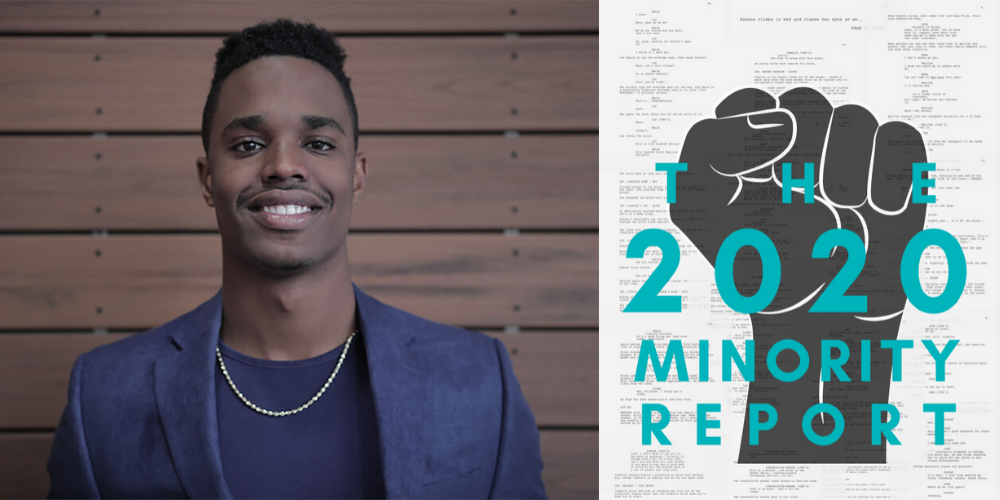
In 2019 Mallom Liggon ’21 co-created The Minority Report, a competition that mirrors the film industry’s “Black List” for screenplays written by students of color and other underrepresented groups. It’s the first effort of his organization Diverso, which is building a student-led production fund to eliminate the financial barriers that young minority filmmakers face when entering the industry. Liggon is also co-president of SFTV’s Storytellers of Color Organization and a dual major in screenwriting and African-American studies. We spoke to him just after The Minority Report just announced its first two fellows.
Tell us more about how The Minority Report came about.
At the internships I’ve done, improving diversity was discussed a lot but nobody seemed to know how to do it. I often heard that “no one could find” qualified people of color to write concepts and treatments. I connected with Frankie Li at Harvard through SFTV’s Storytellers of Color Organization last year when our former president posted something on Facebook. He and I have worked together ever since. We got the word out through emails, phone calls, anything to get folks involved. Shailha Alam at Columbia University and Matt Zhang at Vanderbilt University helped us with logistics also. We got more than 60 entries on this first go-around. My hope is that over time this program becomes a pipeline for developing young talent, and industry people can draw from it year after year when they’re hiring.
What kinds of perks do the fellows get?
Their screenplays will be hosted for three months on the Black List website. That means their scripts will be read by agents and Hollywood executives. They’ll also have a series of phone calls with people who can offer advice on a bunch of topics, like finding an agent. And after that they’ll have four generals with production companies—these are meetings for writers to tell potential employers who they are and what subjects and genres interest them.
You’ve already done three industry internships. What advice do you have for peers about getting an internship as a student?
It’s never too soon to start working. You can practice filmmaking skills just about anywhere. In high school I worked for a company that produced video content for churches in the community. The things I learned at that job have helped me so much as a student.
Also, if you start looking at internships early, say as a freshman, you’ll get used to juggling schoolwork and putting in the hours at a job. It’s definitely a time commitment. But it will make you a better student, better able to manage your time, and better prepared to go to work once you graduate.
And don’t be afraid to negotiate with the companies you’re interning for. A lot of internships are unpaid, which is a big financial risk for most students. But you should ask employers to pay for things like lunch or ride-share services. I’ve had success with this and I encourage everyone to speak up about these issues.
You got into film school at NYU and Emerson as well as LMU. Why did you decide to come here?
I liked the vibe of the tight-knit, small community within the big city. Los Angeles is the center of the entertainment business and I wanted to be close to all the opportunities here. Plus when I toured the campus, I saw some student protests—that was important to me—I wanted to be among peers who are socially aware and politically engaged. I’ve been really happy with my decision. My professors are really supportive of all I’ve done and they’ve been incredible mentors to me, especially Michelle Gillie and Marilyn Beker.
I also like the types of discussions we have at SFTV about filmmaking. In our classes, we study films and TV not only to analyze whether they’re made well but also to discuss the impact they might have on people and society. It’s a unique and richer way of looking at this work, and I’ve come to love it.
You’re a double major in screenwriting and African-American studies. How do these two subjects inform each other?
My goal is to become a screenwriter and what interests me most is telling stories about Black people. So I want to learn all I can about Black history and culture because that knowledge will make me a better storyteller. At the same time, even though I want to write stories about Black people, I want people of all kinds to see my work. So I’m learning as a screenwriter not just how to write great stories, but how to get them made and how to navigate the business of media and entertainment. That combination will help me get my stories out there.
Tell me about the short film you’re making this semester.
It’s called 2003 and it’s a sneak peek at a TV series I’m working on. It’s set in 2003 and it’s about a young man, a struggling L.A. writer, who takes a job at an agency and gets pulled into the criminal underworld of Hollywood. I was inspired to write this story because I often think to myself, you know, I could do everything right in college and yet it’s still possible that I’ll struggle once I graduate. That I might not be able to break into the industry in the ways I want to. It’s a tough business—there are no guarantees. So I put myself into the shoes of this character who worried about this stuff and created a world around him. Basically I wrote about my anxiety as a way to manage it. But I also manage anxiety by staying involved in lots of activities. I like to get things done.



